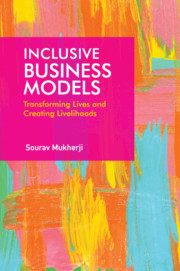Book contents
- Frontmatter
- Dedication
- Contents
- List of Tables
- List of Figures
- Preface
- Acknowledgements
- 1 Introduction
- 2 Vaatsalya Hospitals: Affordable Healthcare in Proximity
- 3 Gyan Shala: Providing Inclusive Education
- 4 Rang De: Creating a Platform for Social Investing
- 5 Labournet: Empowering Informal Sector Labourers
- 6 Selco: Inclusive Model for Energy Access
- 7 Hasiru Dala Innovations: Improving Lives of Waste Pickers
- 8 Reliance Retail: Creating Inclusive Supply Chain
- 9 International Development Enterprise (Ide) Nepal: Developing Smallholder Ecosystem
- 10 Ruralshores: Delivering Inclusive Service
- 11 Gujarat Narmada Fertilizer Company’s (Gnfc) Neem Initiative: A Social Business
- 12 Bringing it All Together
- References
- Index
3 - Gyan Shala: Providing Inclusive Education
Published online by Cambridge University Press: 31 July 2021
- Frontmatter
- Dedication
- Contents
- List of Tables
- List of Figures
- Preface
- Acknowledgements
- 1 Introduction
- 2 Vaatsalya Hospitals: Affordable Healthcare in Proximity
- 3 Gyan Shala: Providing Inclusive Education
- 4 Rang De: Creating a Platform for Social Investing
- 5 Labournet: Empowering Informal Sector Labourers
- 6 Selco: Inclusive Model for Energy Access
- 7 Hasiru Dala Innovations: Improving Lives of Waste Pickers
- 8 Reliance Retail: Creating Inclusive Supply Chain
- 9 International Development Enterprise (Ide) Nepal: Developing Smallholder Ecosystem
- 10 Ruralshores: Delivering Inclusive Service
- 11 Gujarat Narmada Fertilizer Company’s (Gnfc) Neem Initiative: A Social Business
- 12 Bringing it All Together
- References
- Index
Summary
There are 1.5 million schools in India catering to 250 million students. Eighty-five per cent of these schools are located in rural India and 75 per cent of them are run by the government. However, the share of students going to private schools has been steadily increasing and the 25 per cent of schools that are run privately cater to little less than 50 per cent of students (Majumdar 2018; Nambissan 2012). While in developed countries, private schools typically cater to students from rich households, Indian private schools cater to students coming from a wide economic background, such as children of migrant labourers to those of company CEOs and rich businessmen. Low-cost private schools are a set of schools that cater to children from low-income households. They are often run by individuals from their homes, charging fees that are lower than those of government schools and sometimes even lower than the minimum daily wage, as earned by the parents of these children. It is unofficially estimated that about 92 million children are enrolled in about half a million low-cost private schools in India.
The need for such low-cost private schools that can educate children from poor households is likely to grow in India, given (a) the large-scale migration that continues to happen from villages to cities; (b) failure of the government to expand its schools in urban areas to keep up with the pace of urbanization; and (c) poor public perception of the quality in government schools. Migrant labourers typically settle in slums in the cities, places that are characterized by poor infrastructure, high population density and lack of basic amenities. Eijipura in Bengaluru, purportedly the largest slum in the city dubbed as the Silicon Valley of India, is an example. It has 10,000 school-age children living within an area of 7.5 square kilometres. If one has to follow government regulations regarding minimum space that is required to set up a school, only two schools can be established in this area, which can cater to a maximum 2,000 children. Therefore, the need for the 8,000 remaining children can only be fulfilled by low-cost private schools.
- Type
- Chapter
- Information
- Inclusive Business ModelsTransforming Lives and Creating Livelihoods, pp. 48 - 71Publisher: Cambridge University PressPrint publication year: 2021



